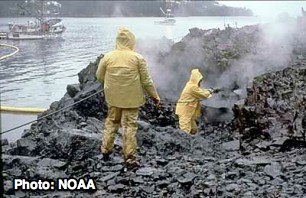 (Emily Pickrell, Houston Chronicle)
(Emily Pickrell, Houston Chronicle)
As a federal judge considers whether to approve a huge civil settlement in the 2010 oil spill, thousands of Gulf Coast residents owe their day in court to a law that arose from the Exxon Valdez disaster 23 years ago. The litigation over the spill from BP’s Macondo well is the biggest test so far of the Oil Pollution Act of 1990, and economic victims of the Gulf spill likely will fare better than those who suffered from the 1989 tanker accident in Alaska.
While some plaintiffs have expressed frustration that the settlement process has taken two years, legal experts say that one of the biggest benefits of the oil pollution legislation has been how it has helped move along the resolution process, sidestepping much of the legal fighting that became the heart of the Valdez negotiations. Under the act, liability for an oil spill falls to the operator of a project – BP and co- owners of the Macondo well, in the case of the Gulf spill.
“With Exxon Valdez, there were decades of litigation about fault and responsibility, but the Oil Pollution Act makes it very simple,” said Martin Davies, a maritime law professor at Tulane University. Speaking of oil operators, he said, “Under OPA, you are strictly liable, whether or not you were at fault and you have just got to pay, which has made it really simple and has been very effective. It is why BP has been paying up since day one.”
Congress passed the Oil Pollution Act in 1990 in response to the environmental and economic devastation when the Exxon Valdez tanker ran aground the year before and spilled 257,000 barrels of crude into the pristine waters of Alaska’s Prince William Sound. Maritime law then protected those directly injured by the spill, but not those who lost their livelihoods in its aftermath – leaving many Alaska businesses and individuals unable to collect damages.
“We had nothing but old maritime law, and Exxon denied responsibility for most of the damages,” said David Oesting, a lawyer who represented many of the fishermen in the Exxon Valdez case. “They contended that they were trumped up and phony.”
Oesting said that in the Valdez case, many of the businesses that were indirectly hurt by the spill – such as boat repair yards, pipe stack supply companies, cold storage business – were excluded because they couldn’t prove a direct connection between the spill and their losses.
“They didn’t touch the fish,” Oesting said. “They didn’t touch the fish, so they didn’t have a claim, because the economic loss was very narrowly constrained to the distribution of the fish, not to the people who worked collaterally in the direct chain of fish processing.”
Congress passed the Oil Pollution Act as an amendment to the Clean Water Act. [And] in addition to explicitly making operators liable, it allowed for damage claims “due to the injury, destruction or loss of real property, personal property or natural resources.”
The phrase “due to” suggests that some kind of relationship must exist between the accident and the damage suffered. That has brought legions of lawyers into the cases, as they try to sort out the boundaries of BP’s economic responsibility.
“The ‘due to’ clause of OPA is an additional layer of legal proof related to connecting someone’s economic losses to the oil spill damage,” said Chris Dean, a lawyer for several business spill claimants. “It is a big tool for courts to separate the Moe, Larry and Curly claimants from those with legitimate claims.”
Still, that expansion of possible economic claims has added thousands of plaintiffs in the Gulf Coast litigation.
(Read more at FuelFix Blog/Houston Chronicle)
wLOCAL AREA HEADLINES:
- Veteran Unemployment, Hard Barrier To Overcome (KUHF Public Radio)
- Sheriff’s Office, Immigration Officials Negotiate Jail Screening Program (Houston Chronicle)
- Cancer Agency Faces Challenges in Months Ahead (Houston Chronicle)
- High Tech Health Tests Make Things Easier (KTRK 13 News)
- Is State Paying Off Bonds for a Montgomery County-Owned Psychiatric Hospital? (Austin Statesman)
- Friends Plead for Help for 550-Pound Homebound Man (KHOU 11 News)
- More Women Are Opting-In For Full Mastectomies (92 FM News)
- Friends with Money: Dueling Docs at a Heartfelt Dinner Help Raise $600,000 for Research (Houston Culture Map)
STATE, NATION & WORLD
- What Are The Mangrove Trees Telling Us About The Texas Coast? (State Impact Texas)
- Teachers Changing How They Interact with Kids (Houston Chronicle)
- For Some Soldiers, beer is cheaper than therapy (Austin Statesman)
- “Million Muppet March” Planned to Defend U.S. Backing for PBS (Reuters)
- A Risky Lifeline for Seniors Is Costing Some Their Homes (New York Times)
- Insurers Offer New Programs to Help Disabled Return to Work (Washington Post)
- A Grand Experiment to Rein In Climate Change (New York Times)
- Malala Yousafzai Is Sent to Britain for Medical Treatment (New York Times)
